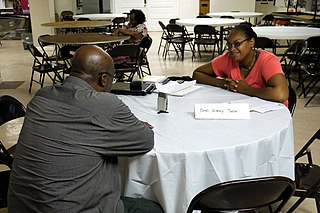
Oral history is the collection and study of historical information about people, families, important events, or everyday life using audiotapes, videotapes, or transcriptions of planned interviews. These interviews are conducted with people who participated in or observed past events and whose memories and perceptions of these are to be preserved as an aural record for future generations. Oral history strives to obtain information from different perspectives and most of these cannot be found in written sources. Oral history also refers to information gathered in this manner and to a written work based on such data, often preserved in archives and large libraries. Knowledge presented by Oral History (OH) is unique in that it shares the tacit perspective, thoughts, opinions and understanding of the interviewee in its primary form.

Natick is a town in Middlesex County, Massachusetts, United States. It is near the center of the MetroWest region of Massachusetts, with a population of 37,006 at the 2020 census. 10 miles (16 km) west of Boston, Natick is part of the Greater Boston area. Massachusetts's center of population was in Natick at the censuses of 2000-2020, most recently in the vicinity of Hunters Lane.

Framingham is a city in the Commonwealth of Massachusetts in the United States. Incorporated in 1700, it's located in Middlesex County and the MetroWest subregion of the Greater Boston metropolitan area. The city proper covers 25 square miles (65 km2) with a population of 72,362 in 2020, making it the 14th most populous municipality in Massachusetts. Residents voted in favor of adopting a charter to transition from a representative town meeting system to a mayor–council government in April 2017, and the municipality transitioned to city status on January 1, 2018. Before it transitioned, it had been the largest town by population in Massachusetts.

The Radcliffe Institute for Advanced Study at Harvard University, also known as the Harvard Radcliffe Institute, is an institute of Harvard University that fosters interdisciplinary research across the humanities, sciences, social sciences, arts, and professions. It is the successor institution to the former Radcliffe College, originally a women's college connected with Harvard.

The Yiddish Book Center Yiddish: ייִדישער ביכער־צענטער, romanized: Yidisher Bikher-Tsenter, located on the campus of Hampshire College in Amherst, Massachusetts, United States, is a cultural institution dedicated to the preservation of books in the Yiddish language, as well as the culture and history those books represent. It is one of ten western Massachusetts museums constituting the Museums10 consortium.
The Minuteman Library Network (MLN), founded in 1984, is a consortium of 41 public and academic libraries in the MetroWest and southern Middlesex County areas of eastern Massachusetts, US that share resources, patrons and services. The Network has over 6 million items and over 680,000 cardholders. Resources are shared. People who live, work, or study in Massachusetts are eligible for a card, which can be used to borrow items from Minuteman libraries.
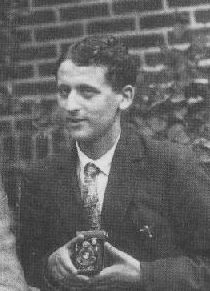
Samuel Abraham Goudsmit was a Dutch-American physicist famous for jointly proposing the concept of electron spin with George Eugene Uhlenbeck in 1925.

The Arthur and Elizabeth Schlesinger Library on the History of Women in America is a research library at the Radcliffe Institute for Advanced Study, Harvard University. According to Nancy F. Cott, the Carl and Lily Pforzheimer Foundation Director, it is "the largest and most significant repository of documents covering women's lives and activities in the United States".
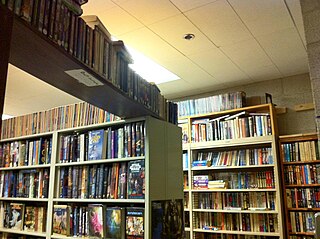
The MIT Science Fiction Society of the Massachusetts Institute of Technology is a student organization which maintains and administers a large publicly accessible library of science fiction, fantasy, and science fantasy books and magazines.

The Cochituate Aqueduct was an aqueduct in Massachusetts that brought water to Boston from 1848 to 1951.
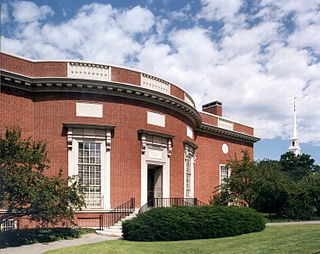
Houghton Library, on the south side of Harvard Yard adjacent to Widener Library, Lamont Library, and Loeb House, is Harvard University's primary repository for rare books and manuscripts. It is part of the Harvard College Library, the library system of Harvard's Faculty of Arts and Sciences. The collections of Houghton Library include the Harvard Theatre Collection and the Woodberry Poetry Room.
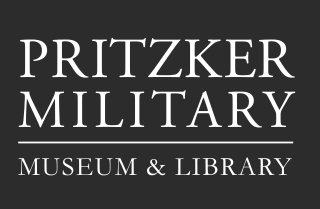
The Pritzker Military Museum & Library is a non-profit museum and a research library for the study of military history on Michigan Avenue in Chicago, Illinois. The institution was founded in 2003, and its specialist collections include material relating to Winston Churchill and war-related sheet music.
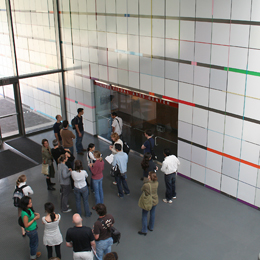
Established in 1950, the List Visual Arts Center (LVAC) is the contemporary art museum of the Massachusetts Institute of Technology. It is known for temporary exhibitions in its galleries located in the MIT Media Lab building, as well as its administration of the permanent art collection distributed throughout the university campus, faculty offices, and student housing.

Natick High School is an urban/suburban public high school serving students in grades 9 to 12 in Natick, Massachusetts, United States. The school is located on the banks of Dug Pond. Its enrollment was 1,603 students during the 2015–2016 school year. The original building was built in 1953 at approximately 189,000 sq ft (17,600 m2). and opened in 1954. The building was expanded in 1965. Additional renovations took place in 1985. In 2010, the town voted to replace the Natick High School building. The new facility was constructed on the fields immediately to the south of the former building. Demolition on the former building began on June 25, 2012. The new building design is based on a model approved by the state of Massachusetts. This was necessary in order to maximize state reimbursement for design and construction; it cost $78 million. The new high school opened to students on August 29, 2012.

The International Museum of World War II was a nonprofit museum devoted to World War II located in Natick, Massachusetts, a few miles west of Boston. It was formed over a period of more than 50 years by its founder, Kenneth W. Rendell, one of the world's premier dealers in autographs, letters and manuscripts, who has earned international renown as an authenticator of historic artifacts. The museum's collections documented the events of the war, from the signing of the Treaty of Versailles ending World War I to the Nuremberg and Tokyo war crimes trials. The museum's goal was to preserve the reality of the history of World War II and to provide an educational experience of the lessons to be learned. In 2016, the Museum of World War II became The International Museum of World War II to reflect its being the only museum in the world with an international collection of letters, documents, and artifacts.

The State Library of Massachusetts in Boston, Massachusetts was established in 1826 and "supports the research and information needs of government, libraries, and people through ... services and access to a comprehensive repository of state documents and other historical items." It "opened in 1826 and has been in its present location in the State House since the 1890s." The State Library falls under the administration of the governor.

The Association for Diplomatic Studies and Training (ADST) is a United States 501(c)(3) non-profit organization established in 1986 by retired Foreign Service officers, headquartered at the George P. Shultz National Foreign Affairs Training Center in Arlington, Virginia. It produces and shares oral histories by American diplomats and facilitates the publication of books about diplomacy by diplomats and others. Its Foreign Affairs Oral History program has recorded over 2,600 oral histories and continues to grow; its book series includes over 100 books. ADST is located on the campus of the Foreign Service Institute in Arlington, Virginia. ADST is the sole American private organization principally committed to the collection of documents about recent U.S. diplomatic history.

The Boston Medical Library of Boston, Massachusetts, was originally organized to alleviate the problem that had emerged due to the scattered distribution of medical texts throughout the city. It has evolved into the "largest academic medical library in the world".

Ruth Edmonds Hill was an American scholar, oral historian, oral storytelling editor, journal editor, educator, historic preservation advocate. Her oral history office is part of the Radcliffe Institute for Advanced Study at Harvard University. She is an iconic figure among oral storytellers, particularly in the United States but also abroad, and has advised storytellers' organizations. Her spouse is Dr. Hugh Morgan Hill who is also known as Brother Blue. Ruth Edmonds Hill is sometimes known as Sister Ruth. Ruth Edmonds Hill is the daughter of Florence Edmonds of western Massachusetts, whose life story is chronicled and has been critically analyzed as part of African-American oral history. Hill has degrees from Simmons College and the University of Massachusetts Amherst.

The Samuel Proctor Oral History Program (SPOHP) is the official oral history program at the University of Florida. With over 6,500 interviews and more than 150,000 pages of transcribed material, it is one of the premier oral history programs in the United States. SPOHP's mission is "to gather, preserve, and promote living histories of individuals from all walks of life." The program involves staff, undergraduate and graduate students, and community volunteers in its operation.




















